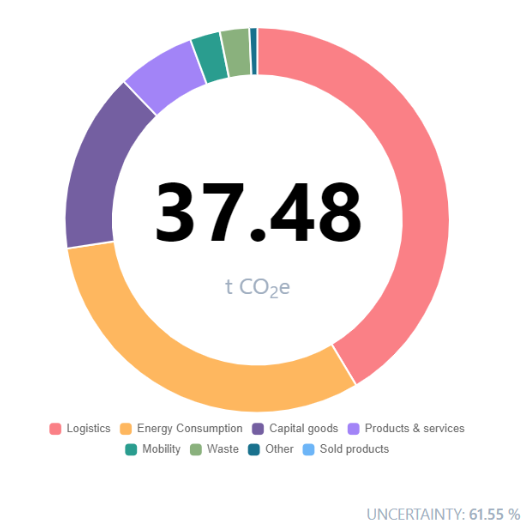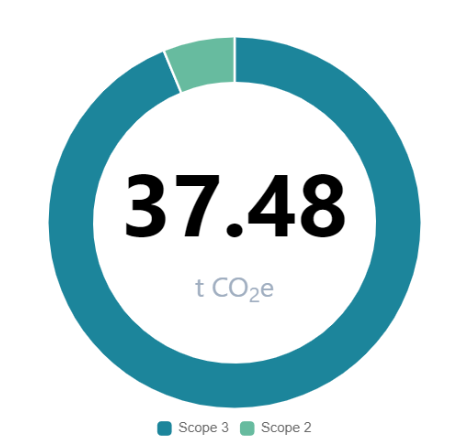
urbike x hub.brussels x Tapio : join the peloton of the climate transition
For a few years now, some companies have been acting against global warming. urbike is one of them. Join the climate transition peloton to inspire change in your sector!

Starting point
Founded in 2018, the Brussels-based cyclo-logistics cooperative urbike offers an ecological and economical solution for the last mile of goods deliveries in the city. A very welcome service in these times of energy crisis, when a kilometre by electric cargo bike is almost 11 times cheaper than a kilometre by electric van. The cooperative’s raison d’être is to transform urban mobility to make Brussels a more sustainable, more human and a better city to live in.
To achieve this goal, the cooperative can count on some forty couriers and a fleet of some forty electric cargo bikes and numerous bicycle trailer solutions. In 2022, the staff travelled 160,000 km to deliver almost 250,000 parcels in Brussels and Ghent. In addition to its operational activities, urbike is working behind the scenes to accelerate the transition by supporting companies and cities with training and consultancy.
But urbike does not intend to stop there. By 2026, the cooperative aims to quadruple the volume of deliveries to Brussels. It also plans to triple the number of employees (currently 40 or more) to 120, the majority of whom will be permanent employees (couriers and other services such as consultancy), and to encourage more partners to join the peloton.
The adventure of decarbonisation coaching
Initially, urbike wanted to understand and quantify its main sources of emissions in order to know where to act. In 2022, the company was selected with five other startups (except for Manufacture Belge de Chocolats, which is a manufacturing company) to participate in a decarbonisation coaching. The coaching was led by June Van Veer, sustainable business model advisor at hub.brussels, and Tapio’s employees. At the end of this coaching, the participating companies not only became aware of their impact, but also left with solutions to reduce it. Read more about this in our case studies.
This support has already enabled urbike to implement several actions to reduce its impact. For example, to reduce its heating consumption, the company decided to reduce the temperature of its warehouse and to install a thermal curtain at the entrance to the warehouse. The installation of decentralised lighting in the offices and the reminder of good habits (e.g. switching off all devices on standby and/or not in use) are also part of the solutions taken from the coaching. The solutions that urbike intends to implement will be described in more detail further.
Results analysis
The high level of commitment shown by the urbike representative during the coaching process resulted in a very comprehensive carbon report. The majority of the cooperative’s report is made up of emissions associated with logistics and energy consumption. Each company has its own main sources of emissions. These may be directly associated with the fuels used within its infrastructure (Scope 1), its electricity consumption (Scope 2), or other links in its value chain (Scope 3). You can read more about the scopes and the emissions they cover in our article. In urbike’s case, as shown in the diagram at the level of the scopes, we can see that Scope 3 emissions represent the majority of its balance sheet (93.8%). They are followed by scope 2 emissions (6.2%), which include emissions linked to the electricity needed for the offices and to recharge their bikes. The cooperative does not generate any emissions associated with scope 1.
The second illustration provides a more detailed analysis by driver. As mentioned earlier, the logistics driver is the most important one with 41.4%. However, this driver does not only include the emissions generated by the electric bike deliveries made by urbike. In fact, these represent only 128 kgCO2e, or 0.3% of the total. In reality, the vast majority of the emissions linked to logistics come from the transport of goods by customers, upstream of the “last miles” carried out by urbike, also known as “upstream transport”. In other words, customers supply their goods by truck and van, while urbike only intervenes at the end of the chain to make the last mile deliveries by bike.


Energy consumption, including heating and electricity for the premises, is in second place with 31.2%, followed by the driver of fixed assets (15.1%) representing emissions related to the production of electric bicycles, bicycle equipment, IT equipment and furniture. Next come emissions linked to the purchase of products and services (6.55%) and mobility (2.5%). For the latter, it should be noted that employees already favour soft mobility (cycling, walking, public transport) for home-to-work journeys and that business trips are almost exclusively made by train or, in very rare cases, by shared car. Finally, the remaining emissions come from waste (2.5%) and other categories (0.7%), which include, for example, emissions from employees’ home heating and electricity use when teleworking.
Solutions
Aware of its impact and thanks to the decarbonisation coaching, urbike is already considering other solutions to reduce its impact. It should be noted that the cooperative was already implementing a whole series of actions before its support with hub.brussels and Tapio, such as the promotion of soft mobility, the purchase of second-hand furniture and IT equipment, or by regularly maintaining its equipment to keep it as long as possible.
1. Logistics and upstream transport
The main area of reduction concerns the emissions associated with upstream transport. As mentioned above, the goods that urbike picks up in the last mile are mainly transported by trucks or vans. Even though shipments are generally optimised with full supply vehicles, it is difficult to apply this process to deliveries by trailer and containers from further away.
Several solutions and actions can be taken to reduce logistics-related emissions. One of them would be to optimise trailer and container deliveries with “forward buying“. In concrete terms, the idea is to have as many goods as possible arriving at once rather than being transported piecemeal. In other words, this would allow the cooperative to make maximum use of its warehouse capacity, whereas a piecemeal arrival would force it to use only part of it.
A medium-term action would be to encourage suppliers to opt for greener modes of transport (e.g. electric), even if this means translating this into contractual clauses. However, this action depends mainly on the willingness of suppliers to continue their transformation towards more environmentally friendly modes of transport.
2. Energy consumption
In order to reduce its energy consumption, urbike intends to use electricity and natural gas. In terms of electricity, this would mean switching to green electricity, or replacing the light tubes (which account for 80% of the electricity bill) with LED lamps. In the long term, the cooperative also wants to produce its own electricity using photovoltaic panels on the roof and façade of the building. The natural gas solution would involve insulating the buildings to reduce consumption and improving energy efficiency such as the heating system.
A dynamic and intuitive platform
The cooperative’s experience on Tapio’s platform has been positive, as highlighted by Jacques Menu, consultant at urbike. The intuitive and dynamic nature of the platform was particularly appreciated, as was its ability to provide a clear view of the results and the Carbon Strategy Page. This vision confirms the small footprint generated by a kilometre travelled by cargo bike compared to a kilometre travelled by motor vehicle. A result that motivates the company more than ever in its mission to accelerate the transition towards sustainable urban logistics.
Join now the peloton towards climate transition
In recent years, companies such as urbike have not waited to get into the saddle to take action against global warming. The climate transition involves many challenges. However, as Jacques Menu points out, the important thing is to focus on concrete and directly implementable actions.
As a company, you are not alone. As the coaching with hub.brussels has shown, many companies are motivated to join the peloton. The idea is not to be systematically “peloton leaders”, but simply to start acting at your level. To do so, estimating your impact is the first essential step. Do you have any questions on this topic? Don’t hesitate to contact us to book a demo!